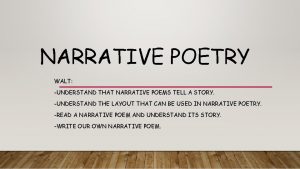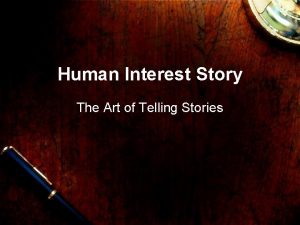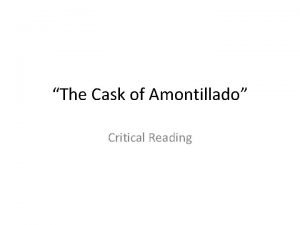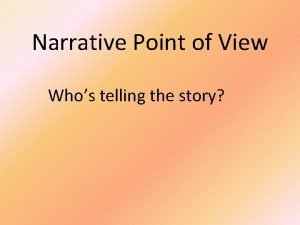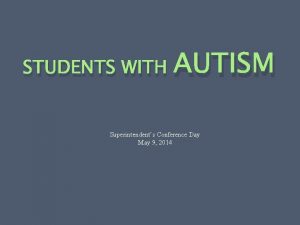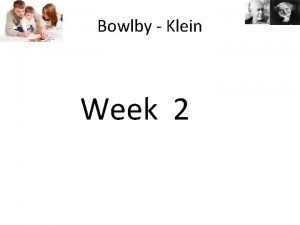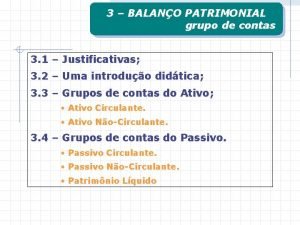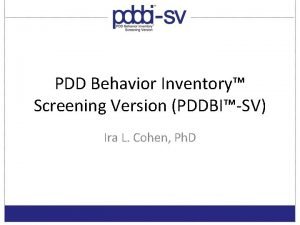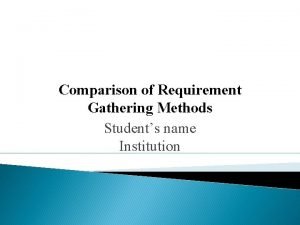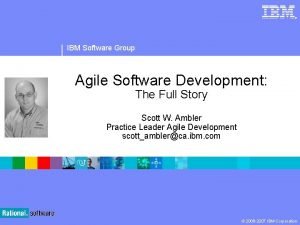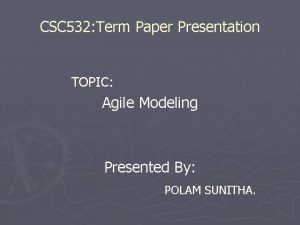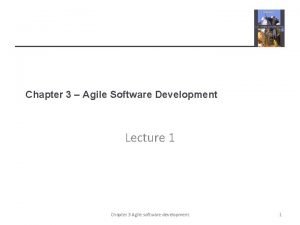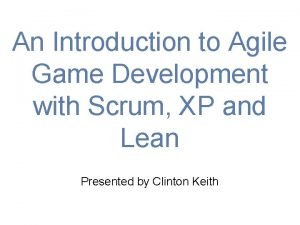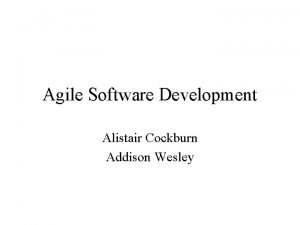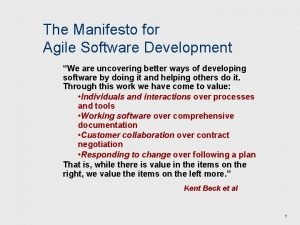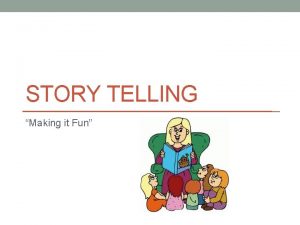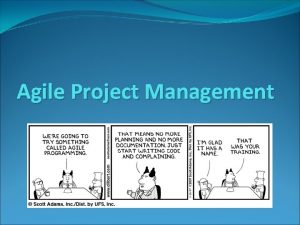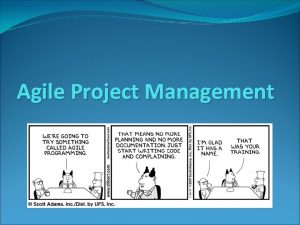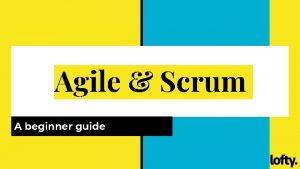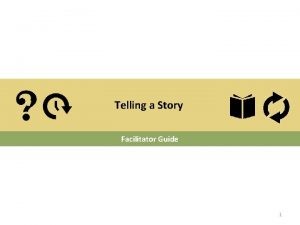Professional Development Day PDD Agile Story Telling Requirements































- Slides: 31

Professional Development Day (PDD) Agile Story Telling Requirements Refinement Getting Stories Ready for the Development (Cross-functional Dev & Test) Teams Looking at XP, Scrum, Kanban or Lean www. Greg. Mester. com

Agenda • Agile Story Telling – Gathering Requirements • Information Circles • Change – Right Sizing of Stories • Value / Prioritize • Feature Decomposition • Time Box Consideration – Refinement of Stories • Refinement Flow • Work Flow • Health of the Backlog – Agile Extras • Appendix: – Different Agile Environments • XP, Scrum, Kanban, Lean www. Greg. Mester. com

Gathering Requirements: Information Circles

Information Circles – Building the Backlog • Attending Demonstrations • Information Gathering Sessions • Product Owner / Business Meetings / Customer Meetings – Don’t let the PO go without the BA – Risk Information Lost • Vision Meetings • Proof of Concepts or Spike Demonstrations

Rate of Change • • Myth: Agile Development = Requirements Change at Any Time 24× 7 Truth: Requirements Don’t Change While Developing • Scrum Change: Time Box Based, Change at Beginning of Each Sprint • Kanban Change: To Do WIP Limit Based – Add new Story/Requirement when one is Pulled from “To Do” to “In Process”

Scrum Sprint Calendars

Vision & Value • • Brand User Profiles Goals Site Audit User Needs Create User Stories Site Map Wireframes • • • Awareness Engagement Retention / Return Referral Revenue

Prioritize Mo. SCo. W • Mo. SCo. W and ROI with the following prioritized order: 1. 2. 3. 4. 5. 6. 7. 8. Customer MUST Have (The “M” in Mo. SCo. W) Brings in Immediate CASH INCOME – ROI Customer SHOULD Have (The “S” in Mo. SCo. W) Saves the Company Money – ROI Customer COULD Have New Customer – Future ROI Won’t Have (Would like) Gold Plating – Only after the company pays bonuses and donates to charity

Prioritize – Cash Flow & Customer

Vision (Prioritizing Features and Build Pieces)

Feature and Story Decomposition • Feature Characteristics Story Characteristics • – Very Large Story – Typically Lots of “And’s” in the description – Can bridge more than one Sprint – Made up of more than one Story/Requirement – Integration Testing – Small Size (INVEST) – Very Few if any “And’s” in the descriptions – Complete in one Sprint – Ideally Complete in a day or two • Includes Dev & Testing – Take into account Automation Testing Sprint 1 Feature 1 R Sprint 3 R R R Feature 4 R R Feature 5 Velocity Sprint 4 R Feature 2 Feature 3 Sprint 2 3 3 3 R R 3

Story Writing • INVEST – – – Independent Negotiable Valuable Estimable Small Testable • Definition of Done Working SW Unit Tests Code review Installer Tests Functional Tests Successful Demo to Customer (Product Owner) – Regression Tests – Documentation – – – –

Exercise – 6 Word Stories (5 minutes optional) • There are 6 elements to Business Stories State who the Story is about Describe what is being done Timeframe, when of the story Define Why the Actions are Occurring – Explain how the actions in the story is being taken – Provide Verifiable quantitative evidence of assertion & performance – – • Attempt to write a 6 word Title to Describe your Story Step 1: 1 minute Step 2: 1 minute From lecture and class with: Thomas Cagley - Storytelling Step 3: 1 minute – Example: • As an trouble shooter (TS), I want to move a Email from Triage to the next flow process as New, Bug, Enhancement or Reject within 10 minutes to ensure submission email is properly worked in a timely manner. • As an TS, I want to our Triage Email to the next flow process as New, Bug, Enhancement or Reject within 10 minutes to ensure email is properly worked in a timely manner. • TS Triage Email to next stage after review (10 Mins)

Story Refinement Flow

Measuring Story Refinement Flow (Proof of Concepts, Spikes & UX Proofs)

Scrum Flow

Kanban Flow

Backlog Refinement

Measuring Story Refinement Health of Backlog (Simple Pie Charts) Current Sprint Development Team Task Concentration Sprint +1 Sprint +2 PO / BSA Story Concentration PO Feature Concentration

Measuring Story Refinement Health of Backlog (Cumulative Flow) Current Sprint Development Team Task Concentration Sprint +1 Open/New Refining PO / BSA Story Concentration PO Refined Ready 2 Plan To Do Sprint +2 PO Feature Concentration

Agile Extras • Mixing it all – 3 Amigos (quasi XP) – Used in Scrum & Kanban • Where PO/BA, Dev and Tester get together at the beginning of Sprint or Before picking the Story from the To Do pile • The three work together to determine Acceptance Criteria • PO/BA answers questions from Dev & Tester • Maybe Code in Cucumber and even a little TDD – Lean (Refinement) • Only Refine a Sprint or Two of Stories • Any more is a waste of time and not Lean Thinking • Over Committing is Not Lean Thinking (Watch Velocity) • Don’t waste time Refining Stories that are not going to get “Done” in Next Sprints – What if the Priority Changes? – 20% Over-Commit is 30 min to 2 hours of wasted time per Sprint x Number of people on the Team

Closing: Reference Materials

Thank You and Happy Scrumming • Contact Information: – Would you like an Agile Mentor? – Agile Training – Find out what other Agile Groups are in the Philadelphia area www. Greg. Mester. com Email: greg. mester@gregmester. com Twitter: @gemphilly – Twitter List to follow Agilist around the country • http: //www. gregmester. com/twitter-agilist/ • https: //twitter. com/gemphilly/lists/agilists

Appendix Information • The following slides are a few extra slides that briefly talk to the various Agile Methodologies

Quick Battle Summary • XP – Everyone Working Together to Solve a Problem at The Same Time – Pair Programming, Unit Testing, Integration Testing • Scrum – – • Time Boxed Teaming to solve a problem, but also some me time Cross Trained Team Delivery Kanban – Continuous Pull System – More Individual Approaches – Work In Process or Progress (WIP) Limits • Prevents too much or too little work from entering the system – Quasi-Cross Trained • Lean – Eliminating Waste – Waste in Time – Waiting – Maximize Value Scrum Kanban

Agile Systems or Methodologies • Agile Manifesto – We are uncovering better ways of developing software by doing it and helping others do it. – Through this work we have come to value: • • Individuals and interactions over processes and tools Working software over comprehensive documentation Customer collaboration over contract negotiation Responding to change over following a plan Kanban Scrum Business Analysis Has to Be Agile Lean XP

Extreme Programming (XP) Dev System A Customer Facilitator Mockups Production Data Sampling Tester Dev System B Pair Programming Tester BSA Feature Dev System B Pair Programming Test Driven Development (TDD) Integration Testing Tester Dev System B Tester Pair Programming “XP is a lightweight methodology for small to medium sized teams developing software in the face of vague or rapidly changing requirements” --- Kent Beck Dev System C Pair Programming Test Driven Development (TDD)

Scrum WIP: Team Velocity Scrum Board Time Boxed Test Review or Demo Each Story Sprint Backlog Each Story Dev Product Backlog Done Pile Release Roles: ü Product Owner ü Dev Team ü Scrum Master ü Time-Box ü Planning (Time Box and Daily) × Continuous Flow ü Cross Functional As Much as Possible ü Retrospective

Kanban Board WIP 5 Product Backlog WIP 5 Each Story To Do Dev Test Done Pile Release Each Story Roles × Product Owner × Dev Team ü Dev & Tester × Scrum Master × No Time-Box × Planning (Time Box and Daily) ü Continuous Flow ü Cross Functional When WIP is Maxed out × Retrospective (optional)

Personal Kanban Board

Agile Systems or Methodologies • Mixing it all – Scrum-ban • Combining WIP Limits into Scrum Boards and # of Tasks worked at a time – 3 Amigos (quasi XP) – Used in Scrum & Kanban • Where PO/BA, Dev and Tester get together at the beginning of Sprint or Before picking the Story from the To Do pile • The three work together to determine Acceptance Criteria • PO/BA answers questions from Dev & Tester • Maybe Code in Cucumber and even a little TDD Kanban Scrum – Kanban • Adding Retrospectives – Need to get better as a Team • Adding Time Boxes – Just to clear Done Pile from the tracking systems – Lean (Refinement) • Only Refine a Sprint or Two of Stories • Any more is a waste of time and not Lean XP Lean Thinking • Over Committing is Not Lean Thinking (Watch Velocity) – Don’t waste time Refining Stories that are not going to get “Done” in Next Sprints – What if the Priority Changes? – 20% Over-Commit is 30 min to 2 hours of wasted time per Sprint x Number of people on the Team
 Day 1 day 2 day 3 day 4
Day 1 day 2 day 3 day 4 Day 1 day 2 day 817
Day 1 day 2 day 817 Characteristics of a narrative poem
Characteristics of a narrative poem Human interest story
Human interest story Poe uses several elements of foreshadowing
Poe uses several elements of foreshadowing Story grade 7
Story grade 7 Telling a story without words
Telling a story without words Whos telling the story
Whos telling the story What is pdd-nos
What is pdd-nos What is pdd-nos
What is pdd-nos Pdd model
Pdd model Pdd-mrs
Pdd-mrs Pdd
Pdd Pdd
Pdd Pdd
Pdd Pddbi score meaning
Pddbi score meaning Nato pdd grants
Nato pdd grants Ape paris
Ape paris Requirements gathering methods
Requirements gathering methods Cima membership application
Cima membership application Peter williams of microsoft
Peter williams of microsoft Ibm agile development
Ibm agile development Dilbert agile development
Dilbert agile development Agile model driven development amdd
Agile model driven development amdd Chapter 3 agile software development
Chapter 3 agile software development Agile game development with scrum
Agile game development with scrum Agile embedded software development
Agile embedded software development Alistair cockburn agile software development
Alistair cockburn agile software development Agile development 101
Agile development 101 Agile java development
Agile java development Is agile capitalized
Is agile capitalized Manifesto for agile software development
Manifesto for agile software development


